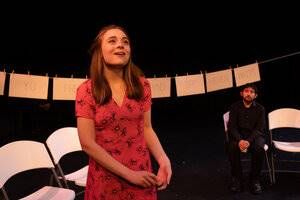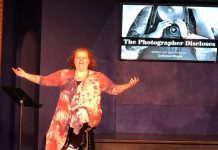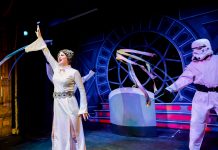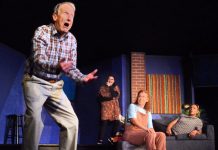Philip G. Bennett operates a Theatre Lab here in Tucson, where he trains people in the acting technique developed in Russia by Konstantin Stanislavski in the early 20th century. Mr Bennett explained the system to an audience at the Scoundrel & Scamp in Tucson, where a “Showcase of Scenes” was recently presented by his students.
“The Stanislavski system is a psycho-physical technique that over a period of 2 to 3 years reunites all the synapses and connexions through the brain and body so that an actor can behave psycho-physically on stage the way he or she would in real life. With that comes aesthetic values, ethical behaviour, and high principles in terms of what one is striving to give to the community and social: we call that social responsibility.
“There are more than 88 elements of technique,” explained Bennett, “and we look at them like you look at the 88 keys on the keyboard on the piano: you have to have all of them at your fingertips to have any kind of mastery. But that takes eight years to become a master of the training. This is the only complete systematised acting technique in the world that is Western-based. It allows the actor to transform into character while still remaining his or herself.
“What Stanislavski did was he studied genius. How do geniuses transform? How does Meryl Streep hold our attention the way she does? What is presence, what is voice, speech, movement? Although most people don’t realise it, the closest art to stage acting is sculpture.
“This performance,” said Bennett, referring to the scenes presented in Tucson, “is about giving them a recital: an opportunity to use the techniques they’re learning in class in front of a paying audience and to give them a chance to solidify that in themselves. Ultimately whatever I teach them is just a foundation to go on to become independent artists.”
The most outstanding performance on offer was the complete short comedic play The Universal Language by David Ives, first performed Off-Broadway in 1993. Ives’ command of the ‘short form’ was very much in evidence as he makes light of the Tower of Babel with his own invented language. Just memorising English must be tough enough for most, but actors Jorge Taborda and Katie Burke had to deliver nonsense, which they did with delightful precision.
Another extended performance of the evening was a scene from the ancient Greek play Medea by Euripides. There was a powerful dynamic between Callie Hutchison as Medea and Kevin Visbal as her husband Jason, whose quest for the Golden Fleece is one of literature’s greatest adventures. The power derived not just from their ability to transform into the characters, as the immersion on the Stanislavski system requires, but in the words from long ago that shows human nature has not changed. When Medea, referring to her faithless husband, states she is “confident in the tongue’s power to adorn evil,” one has only to look at coverage of today’s political rallies to know it is only too true.
Taborda also played in a scene from Lyle Kessler’s 1983 play Orphans. Conlan Salgado plays his younger brother, and the ferocious interplay between the two was the most physically intense of any of the scenes presented. Salgado convincingly portrayed a youth who has been relegated to a life of illiteracy and innocence, as his older brother has kept him a virtual prisoner in their small abode to protect him from the evils of the outside world. So well done by both actors that one would wish to see them in a full production of the play.
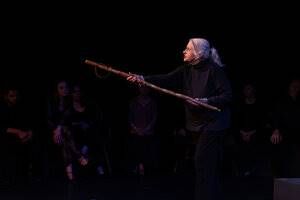
Salgado also delivered a vibrant and puckish performance as Puck, the mischievous sprite from Shakespeare’s Midsummer Night’s Dream. It was one of a sequence of eight Soliloquies selected from The Bard’s plays. John Muller perfectly pitched the guile of the man who became King Richard III; Lance Guzman gave us Edmund with attitude; Bella Vivante was captivating as Prospera; Callie Hutchison as Tatania, Abigail Dunscomb as Emilia and Katie Burke as Ophelia gave us a compelling look at three of Shakespeare’s most engaging female characters; and Kevin Visbal as Angelo from the play Measure For Measure was a delight.
The large cast of the production included Michael L. Laurio, Diana Dubé and John Muller in a scene from Joseph Zeccola’s play Hoodlum on the Roof. A story of maternal fixation, the scene revolved around the meaning of propensity. “You have a propensity to piss me off,” Laurio spits at Dubé. “You have a propensity not to listen” she shoots back. All made delightfully nasty by some fine acting.
Several actors from this performance will be appearing in a full production of Desire Under the Elms by Eugene O’Neill. Showdates are March 6, 7, 8, 12, 14 and 15. Visit the website for tickets: BennettTheatreLab.com
